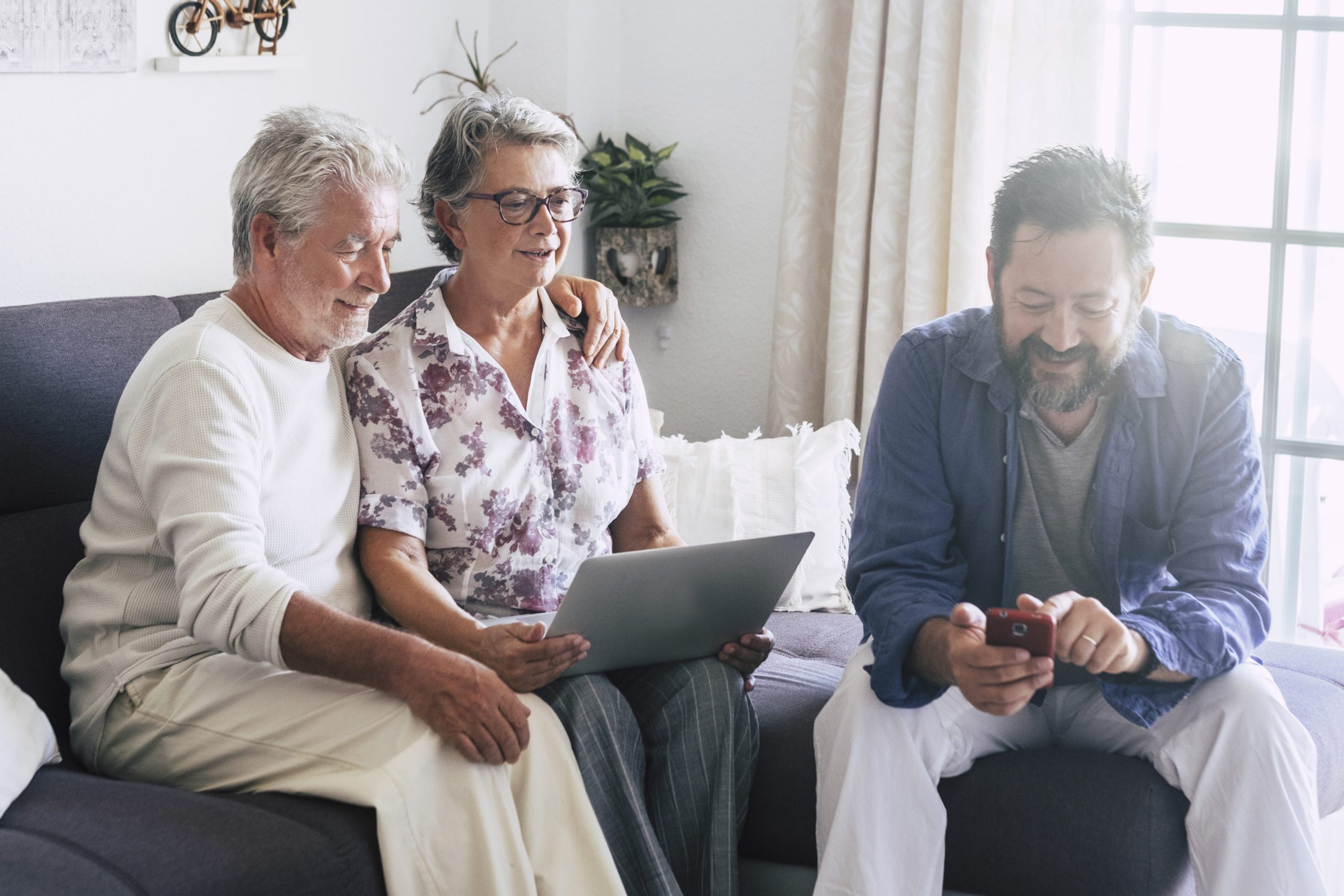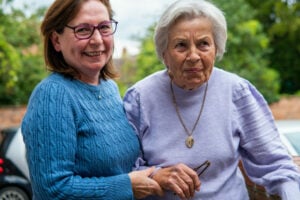8 tips for if you’re caring from a distance
Tags
Elderly Care
Ensuring an older loved one is safe a cared for when you don’t live nearby can be challenging. However, while you can’t just pop in when you’d like, there are things you can do to play an important part in their support network. We’ll look at eight ways you can make a difference in this article.
1. Acknowledge you're a carer
First and foremost, whether you’re 5 or 500 miles away – distance doesn’t make you any less of a carer. If you’re spending your time worrying about a loved one and doing things to help them, you are still a carer can should be recognised as such.
It’s easy to feel excluded from conversations about unpaid care, or that your experience isn’t represented when you’re caring from a distance. And yet, long-distance carers often experience the challenges of caring for a loved one more acutely. Trying to get your voice heard with local social services, or keep on top of their medical appointments and health can be really difficult when you’re not down the road. You may find yourself committing a lot of travel time or spend hours on the phone trying to get things sorted, leaving little time for your own life, or other family commitments.
As a long-distance carer you can benefit from registering as a family caregiver with your GP and your local council.
Ask your GP if they have a Carer Registration form. Once your doctor is aware that you’re a carer they may be able to help you with things like flexible appointments, mental health support, and general information and support.
If you’re over 18 years old and provide regular support to someone you’ll be entitled to a Carers assessment. Contact the local council of the person you’re caring for if you’re in Scotland or England, and your own local council if you’re in Wales. The assessment takes into account all forms of caring, not just things like person care, where you physically need to be present with the person. If you offer emotional support, manage their finances, or do anything to ensure your loved one is safe from harm, a Carers assessment is the first step in getting additional support such as counselling or free training.
2. Created a trusted support network
Of course, if there are other family members who live closer than you do they’ll likely already be involved in your loved one’s care. However you can try expanding your support network even further to ease up your own time and provide greater peace of mind. Connecting with your loved one’s friends and asking them if they’d pop in on a regular basis for a cup of tea and a chat can make a world of difference.
Making friends with your loved one’s neighbours and filling them in on the situation can be beneficial too. Not only does it mean someone else is on hand to respond should an emergency happen, they may be able to help with little things that can have a big impact, such as mowing the lawn, taking the bins out on bin day, or helping with deliveries.
3. Use technology to your advantage
Supportive technology has come on leaps and bounds in the last ten years so there’s no reason for long-distance caregivers to feel completely out of the loop of their loved one’s lives. This technology can support their quality of life and your peace of mind.
Assistive technology such as wearable alarms can alert you or a monitoring team if your loved one falls or needs help. GPS trackers can help you know exactly where a parent is, especially if you’ve tried calling them and they haven’t picked up, or if they are living with dementia and are prone to wandering. And, video doorbells like the Ring doorbell can alert both you and your loved one to visitors.
Smartphone apps can make a big difference too. Jointly from Carers UK is an app for informal carers that combines group messaging, ‘to-do’ lists, shared calendars and useful caring information for all the people in your support network to access and collaborate on.
Using MyElder as a long-distance carer
If you're looking for a home care solution, MyElder is an online portal that's built for caregiver collaboration and can be accessed from anywhere.
With your online account you can find and connect with potential self-employed carers, chat to carers and the Elder team, manage all care information in one place, and read daily care logs from your chosen carer.
Click to get started with MyElder
4. Organise daily household tasks
No matter where you are you can still help with daily activities and support your loved one. This can be especially important if they’re living with limited mobility and can’t get out much, or some level of cognitive decline – such as forgetfulness or early stage dementia
Some caregiving duties that can be managed from afar include –
- Ordering their grocery shopping and deliveries online
- Scheduling meals on wheels / meal delivery services
- Organising taxis or lifts to medical appointments or social clubs
- Helping with medication management, such as ordering repeat prescriptions and providing medication reminders via text. You could also try asking their local pharmacy to organise their medication into a dosette box if they take a lot of different things at different times.
- Managing financial matters, such as setting up direct debits for bills, or helping them to apply for benefits
5. Build catch ups into your routines
Long-distance caregiving can be stressful when you don’t know what’s going on with your loved one, or when something unexpected happens. Organising daily or weekly catch ups with them at a set time can help you stay up to date with their life and health, and give you a better indication when something might not be right.
Video calls or phone calls are a great way to offer companionship and can give your loved one something to look forward to each week.

6. Gather emergency information
While you may not be able to be with your loved one in an emergency or if they become unwell, it can make things easier to have all information about their health, support network, and care preferences in one place, such as a physical folder or one on your computer. This can include things like –
- Contact details of health and care professionals such as their GP, district nurse, pharmacy or care agency
- Non-medical contacts such as friends, neighbours, landlord
- Information about their medical conditions, prescribed medications and doses, hospital admissions and any upcoming appointments
- Details of their support needs and care preferences. For example if they’d prefer to recieve care in their own home, if they’d like a male or female carer, and what they’d likely need help with day to day, such as meal preparation or getting dressed.
- Details of any volunteer services of social clubs they use, including contact information
- information about any special equipment they us, such as a walking frame or bath seat
- Their weekly routine
It may also be useful to work with your loved one to create a contingency plan covering what would happen if they suddenly needed care and you or other members of the family were unable to help. We have a guide on how to put one together here.
7. Explore free services
There are a number of free support and care options that can help lighten the load on long distance carers. These include charities such as The Silverline, Reengage, and The Cares Family, who all specialise in elderly companionship via weekly phone calls or regular meetups with a friendly volunteer.
St Vincent De Paul Society is another charity that offers befriending services and regular visits to elderly people at home. Volunteers can help with transport, meal preparation and organising trips and events.
8. Consider paid help
Professional home care can sometimes seem like a big, expensive step there’s no coming back from. No one likes to think that their parent has reached a point where they can no longer cope alone. However there are many lighter touch and more affordable options you can try first.
Age UK day care centres offer a few hours of support and social activities for older people with lower level care needs.
Visiting care can offer daily or weekly support for more hands-on care needs in a person’s own home. This includes things like washing and dressing, cooking and nutrition and keeping the home clean and tidy.
If a loved one is no longer safe for long periods alone at home, moving into an assisted living facility, where they can retain independence in their own flat, but with the security of on-call staff may be a suitable option. alternatively, a live-in carer who moves into their existing home and adapts to their routine can help bring 24/7 peace of mind too.
A live-in carer sourced through Elder can help with a lot of the tasks outlines in this guide – from food deliveries and help with transport and appointments, to providing personal care and daily updates to family members.
And once you’ve chosen your carer, our MyElder technology makes it easier to manage your loved one’s care needs, stay up to date with their care. build a schedule, and communicate with your carer.
Find out more about live-in care.
Sources –
https://www.carersuk.org/help-and-advice/practical-support/carers-assessment/
https://www.mobiliseonline.co.uk/carers-guide-to-caring-from-afar
https://jointlyapp.com/
Read more family support articles

Feeling trapped caring for an elderly parent
No matter how much you love a parent, shifting from being their child to their caregiver can be incredibly difficult. It’s common to feel ‘trapped’

4 tips for when a loved one is staying in hospital
Having a loved one admitted to hospital is always a concerning time. In this article we’ve looked at advice from the NHS to help you

Informal carers – building a contingency plan
If you’re looking after a loved one, creating a contingency plan – outlining who can take over their care, where their medication is stored, and

Noticed a change – Is it time to talk about care?
Noticed a change? Our free support pack has been designed to help you understand the right time to seek care, and have meaningful conversations about

Finding it difficult to talk about care? You’re not alone.
Elder found 74% of family members would find it difficult to bring up the topic of care with an older loved one. For people who

Home help for the elderly
It’s natural to need a little help with things as we age. However, if you or a loved one is finding daily tasks more difficult,